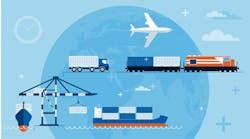A concept based on the principles of designing out waste and pollution, keeping products and materials in use, and regenerating natural systems, the circular economy is a hot topic for at least 70% of supply chain leaders right now.
Compared to the linear economy—where resources are taken from the ground to make products that are used and then discarded—the circular economy promotes environmental sustainability in a world where more consumers are demanding that from the companies they work with.
According to a new Gartner survey, 70% of supply chain leaders are planning to invest in the circular economy in the next 18 months. However, just 12% of those leaders have linked their digital and circular economy strategies with one another. This disjointed approach not only creates inefficiencies, but also keeps organizations from achieving enterprise-wide goals around environmental sustainability.
Economic Growth vs. Consumption
Gartner defines the circular economy as an economic model that “separates the ability to achieve economic growth from the consumption of natural resources.” Those business models encourage continuous reuse of materials to minimize waste and the demand for additional natural resource consumption, it says, noting that the circular economy starts with good design, with end-of-life and raw material reuse in mind.
“The circular economy creates an ecosystem of materials,” said Gartner’s Sarah Watt in a press release. “What was previously viewed as waste now has value. However, those ecosystems are complex and include many interdependencies and feedback loops.”
Watt goes on to say that digital technology has the potential to provide visibility and enable improved decision-making when it comes to raw materials and services. For example, 35% of companies express the view that digital technology will be a key enabler for their circular economy strategies, but very few are leveraging the technology for this purpose.
Reverse Supply Chains
Organizations that are taking steps that promote the circular economy, and want to align those steps with their digital strategies, should start with four key technologies: advanced analytics, 3D printing, the Internet of Things (IoT) and machine learning (ML). Gartner says the top four areas of the supply chain where digital technology is being applied include delivery (for 46% of companies), customer engagement (45%), manufacturing and remanufacturing (43%), and planning (43%). Just 27% of firms are currently using digital technologies to improve reverse logistics, but 39% plan to do so within the next two years.
“The difference in emphasis between delivery and reverse logistics is intriguing,” Watt said, noting that some organizations are using technology like analytics and alternative vehicles to optimize their routes and reduce emissions. “You can argue that those actions should be considered a sustainable practice rather than one that enables the outcomes of the circular economy.”
On the other hand, reclaiming materials at the end-of-life requires reverse logistics for pickup and return to either the organization or a third party. “Our results show that, in the next two years, reverse logistics will garner the most attention,” said Watts. “This indicates that companies are looking at how to take back products for reuse, refurbishment or recycling—an important step on the way to the circular economy.”
No More Take-Make-Waste
As environmentalism and sustainability become an even more important part of our everyday lives, the Ellen MacArthur Foundation says society as a whole will have to transform all of the elements of the “take-make-waste” system: how we manage resources, how we make and use products, and what we do with the materials afterwards. “Only then can we create a thriving economy that can benefit everyone within the limits of our planet,” it notes.











